#best sales pipeline management software
Explore tagged Tumblr posts
Text

Abaca Digital AIM, the best sales automation CRM has a user-friendly interface that makes it easy for anyone to use it. This marketing automation tool in Chandigarh is power packed with a plethora of advanced features to drive value for your business. With Abaca Digital AIM, you can track all your leads, contacts and prospects easily through an intuitive dashboard. It gives you real-time access to important data such as sales pipeline, leads, contact details, etc., which helps you stay ahead of the competition.
#best pipeline management software#marketing and sales automation tool in chandigarh#marketing automation tool in delhi#best sales pipeline management software
0 notes
Text
Boost Your Business with Sales and Lead CRM Management Software Quick Demo - Rocket Singh Software
In today’s competitive business landscape, managing sales leads efficiently is crucial for success. Rocket Singh Software offers one of the best Sales Lead CRM Management software, designed to streamline lead tracking, enhance customer interactions, and boost sales conversions. If you're looking for a quick demo of this powerful CRM software, this blog will walk you through its key features and benefits.
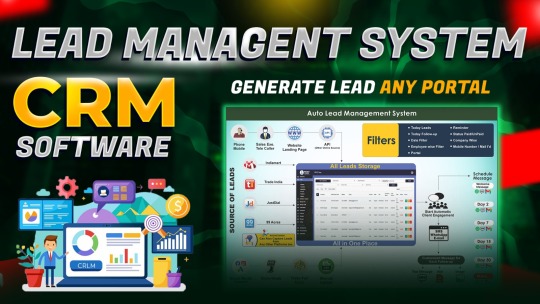
What is Lead Management?
Lead management software is the process of capturing, tracking, and nurturing potential customers until they convert into paying clients. A well-structured lead management system ensures that no opportunity slips through the cracks and helps sales teams maximize their efficiency.
Key Features of Rocket Singh CRM Software for Lead Management:
Automated Lead Capture: Seamlessly collect leads from multiple sources, including websites, social media, and emails.
Lead Scoring & Qualification: Prioritize high-quality leads based on predefined criteria.
Lead Assignment & Tracking: Distribute leads among sales representatives for efficient follow-ups.
Lead Nurturing & Engagement: Automated follow-up emails and reminders to keep prospects engaged.
Analytics & Reporting: Gain insights into lead conversion rates and optimize sales strategies.
What is Sales Management?
Sales management software involves overseeing and guiding the sales process to improve revenue generation and customer relationships. A comprehensive CRM system like Rocket Singh helps streamline sales operations, making them more effective and data-driven.
Key Features of Rocket Singh CRM Software for Sales Management:
Sales Pipeline Management: Visualize the sales funnel and track progress at every stage.
Automated Workflow: Reduce manual tasks with automated follow-ups, notifications, and approvals.
Customer Interaction History: Maintain detailed records of interactions with prospects and customers.
Task & Appointment Scheduling: Organize meetings, calls, and follow-ups efficiently.
Performance Analytics: Monitor team performance and sales trends with real-time reports.
Why Choose Rocket Singh Software for Sales Lead Management?
1. Seamless Lead Capture & Tracking
Automatically capture leads from multiple sources, including websites, emails, and social media.
Assign leads to the right sales representatives for efficient follow-ups.
Monitor lead progress in real time with a centralized dashboard.
2. Automated Sales Workflow
Set up automated follow-ups, reminders, and task assignments.
Reduce manual data entry and let automation take care of repetitive tasks.
Customize sales workflows to match your business needs.
3. Powerful Analytics & Reporting
Gain valuable insights with data-driven reports on sales performance and lead conversion.
Track KPIs to optimize sales strategies.
Generate real-time analytics for data-backed decision-making.
4. Quick Demo: Experience Rocket Singh CRM in Action
If you want to see how Rocket Singh Software can transform your best Sales Lead CRM Management software process, request a quick demo today. The demo will showcase:
A user-friendly interface with easy navigation.
Step-by-step lead management workflows.
Integration with marketing and customer service tools.
Conclusion
Effective best Sales Lead CRM Management software is crucial for business growth, and Rocket Singh CRM software provides a comprehensive solution to streamline these processes. By leveraging its powerful features, businesses can enhance productivity, improve customer engagement, and boost sales conversions.
If you're looking to transform your sales strategy, consider adopting Rocket Singh CRM and take your business to new heights!
More Information:
📞 Contact us at 7600863111
Visit: myrocketsingh.com
Follow us: @Rocketsingh
#Best Sales Lead CRM Software#Top CRM for Lead Management#Sales CRM Software Solutions#CRM for Lead Tracking#Lead Management CRM Tools#CRM for Sales Leads#Sales Lead Tracking Software#Best Lead Management CRM#CRM Software for Sales Teams#Automated Sales Lead CRM#Sales CRM & Lead Management#Cloud-Based Lead CRM#CRM for Lead Generation#Sales & Lead Tracking CRM#Lead Conversion CRM Software#CRM Solutions for Sales Leads#Best CRM for Sales Pipelines#AI-Powered Lead CRM#Small Business Sales CRM#CRM for Lead Nurturing
0 notes
Text
Best Field Service Management Software and a Pipeline Management Process

In today’s highly competitive business landscape, companies must continuously find ways to improve operational efficiency, enhance customer satisfaction, and drive revenue growth. For businesses with field service teams, managing operations effectively is essential. Integrating the best field service management software with a robust pipeline management process can help you achieve these goals by streamlining workflows and ensuring seamless coordination across departments.
At HappSales, we understand the importance of optimizing both field service operations and sales pipelines to help your business thrive. Here's how these two critical components work together to maximize efficiency and profitability.
What is Field Service Management Software?
Field service management (FSM) software is a digital solution that helps companies manage their field operations, including dispatching technicians, scheduling appointments, tracking assets, and communicating with customers. The best FSM software automates manual tasks, increases visibility, and enhances coordination between field teams and back-office staff.
Key Features of the Best Field Service Management Software
1. Intelligent Scheduling and Dispatching
Assign the right technician to the right job based on availability, skills, and proximity, ensuring faster response times and higher first-time fix rates.
2. Mobile Accessibility
Enable field technicians to access job details, update task statuses, and communicate with the office through a mobile app, improving real-time collaboration.
3. Work Order Management
Create, assign, and track work orders in real-time, reducing delays and improving service delivery.
4. Inventory and Asset Tracking
Monitor inventory levels and track the location of assets to ensure that field teams have the necessary tools and parts to complete their tasks.
5. Customer Communication
Keep customers informed with automated appointment reminders, service updates, and feedback requests, enhancing their overall experience.
What is a Pipeline Management Process
A pipeline management process is the structured approach businesses use to track and manage leads, sales opportunities, and service requests as they move through various stages—from initial inquiry to completion. It provides visibility into each opportunity's status, helping businesses forecast revenue, identify bottlenecks, and optimize resources.
Stages of an Effective Pipeline Management Process
1. Lead Generation and Qualification
Identify potential customers and assess their needs to determine if they are a good fit for your services.
2. Opportunity Creation
Convert qualified leads into service or sales opportunities, assigning them to the appropriate team members.
3. Pipeline Tracking
Monitor the progress of each opportunity through stages such as appointment scheduling, service delivery, and follow-up.
4. Task Automation
Automate routine tasks like sending follow-up emails, updating customer records, and generating invoices to improve efficiency.
5. Reporting and Analytics
Analyze pipeline performance to identify trends, measure success, and make data-driven decisions.
Why Integrating FSM Software with Your Pipeline Management Process Matters
Integrating field service management software with your pipeline management process can significantly enhance your business operations. Here’s how:
1. Streamlined Workflows
When FSM software integrates with your pipeline, workflows become more streamlined. For instance, when a new service request is generated, the system can automatically assign a technician, update the pipeline stage, and trigger customer notifications, reducing manual intervention.
2. Real-Time Data Synchronization
Field technicians can update job statuses, upload photos, and communicate with the office in real-time, ensuring that your pipeline always reflects the most current information. This leads to better decision-making and improved customer service.
3. Enhanced Customer Experience
Customers expect fast and reliable service. By integrating FSM software with your pipeline, you can provide accurate service timelines, keep customers informed, and resolve issues quickly, leading to higher satisfaction and repeat business.
4. Improved Resource Allocation
Efficient resource management is critical for both field service and sales operations. FSM software helps you allocate technicians, equipment, and inventory effectively, while pipeline management ensures that opportunities are prioritized and handled efficiently.
5. Data-Driven Insights
Combining FSM software with a pipeline management system provides valuable insights into operational performance. You can track key metrics such as response times, first-time fix rates, and pipeline conversion rates, helping you identify areas for improvement and optimize your processes.
Choosing the Best Field Service Management Software for Your Business
When selecting FSM software, consider the following factors:
• Ease of Integration: Choose software that integrates seamlessly with your existing pipeline management system to ensure smooth data flow and collaboration.
• Scalability: Ensure the software can grow with your business, supporting more users, customers, and complex workflows as needed.
• Customization: Look for a solution that can be tailored to your specific business needs and industry requirements.
• Customer Support: Opt for a vendor that offers reliable customer support to assist with implementation, training, and ongoing maintenance.
At HappSales, we specialize in helping businesses optimize their field service and sales operations. Our solutions are designed to integrate seamlessly with your existing systems, providing the tools you need to improve efficiency, enhance customer satisfaction, and drive growth.
Conclusion
Investing in the best field service management software and integrating it with a well-structured pipeline management process can transform your business operations. By automating workflows, improving real-time collaboration, and enhancing resource allocation, you can achieve higher efficiency, better customer experiences, and increased profitability.
Ready to take your field service and pipeline management to the next level? Contact HappSales today to learn more about our innovative solutions designed to help your business succeed.
#best field service management software#pipeline management process#sales crm for activity#quote management
0 notes
Text
Microsoft Dynamics 365 Sales CRM - Dynamics 365 Services
Dynamics 365 Sales CRM is your one-stop CRM solution, designed to streamline processes, empower teams, and unlock explosive revenue growth.
#dynamics 365 sales crm#dynamics sales crm#dynamics 365 sales#sales crm#sales crm software#best sales crm#lead management software#sales pipeline software#lead management crm#crm sales force#crm for sales reps
0 notes
Link
Dynamics 365 Sales CRM is your one-stop CRM solution, designed to streamline processes, empower teams, and unlock explosive revenue growth.
#dynamics 365 sales crm#dynamics sales crm#dynamics 365 sales#sales crm#sales crm software#best sales crm#lead management software#sales pipeline software#lead management crm#crm sales force#crm for sales reps
0 notes
Text
Microsoft Dynamics 365 Sales CRM - Dynamics 365 Services

Dynamics 365 Sales CRM is your one-stop CRM solution, designed to streamline processes, empower teams, and unlock explosive revenue growth.
#dynamics 365 sales crm#dynamics sales crm#sales crm#sales crm software#best sales crm#lead management software#sales pipeline software#lead management crm#crm sales force#crm for sales reps
0 notes
Text
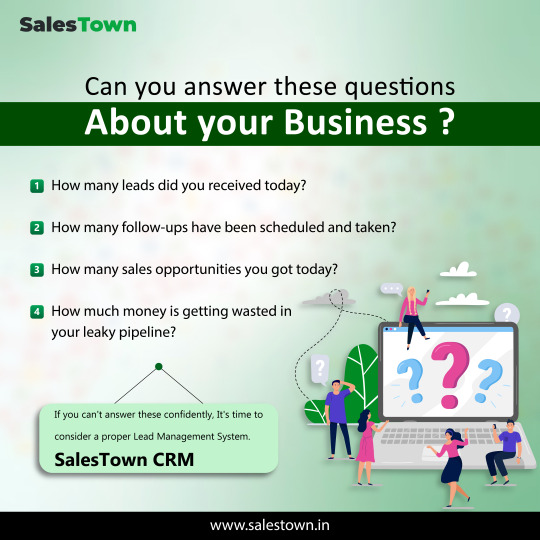
Best CRM Software For Small Business
Salestown CRM is a comprehensive customer relationship management software designed to revolutionize your sales process and supercharge your customer relationships. With its powerful features and intuitive interface, Salestown CRM empowers businesses of all sizes to effectively manage their sales pipeline, enhance customer interactions, and drive revenue growth.
0 notes
Text
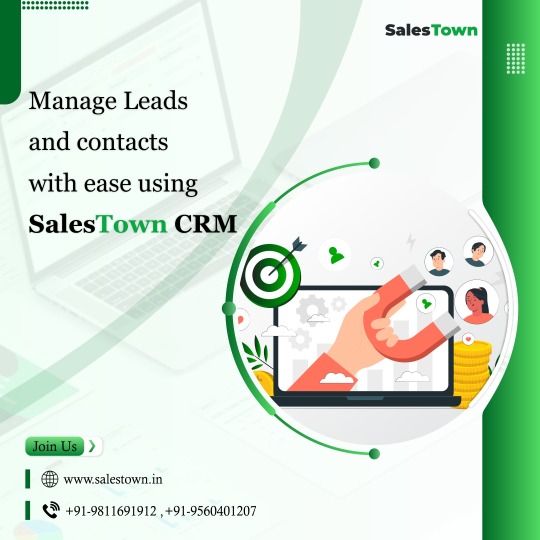
Pipeline Management Software In India
Salestown CRM is a comprehensive customer relationship management software designed to revolutionize your sales process and supercharge your customer relationships. With its powerful features and intuitive interface, SalesTown CRM empowers businesses of all sizes to effectively manage their sales pipeline, enhance customer interactions, and drive revenue growth.
0 notes
Text
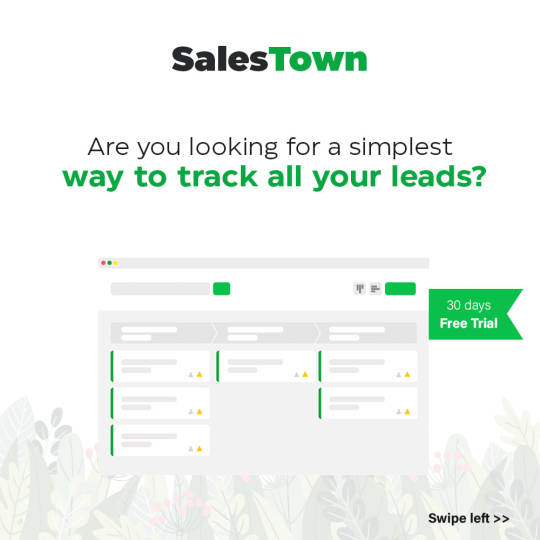
Best CRM Software For Small Business
Discover the best CRM software for businesses that can help you improve customer relationships streamline processes & increase sales with the best CRM software.
#Best CRM Software For Small Business#Sales CRM Solutions#Pipeline Management Software In India#Best CRM Software#CRM Solutions#CRM for Small Business#Sales CRM Software#CRM Software for Small Business#Top CRM Software#Simple CRM#Customer Relationship Management CRM Softwares.
0 notes
Text

Sales pipeline management is a process of tracking and managing sales leads and prospects from the initial contact through the final sale. Sales Pipeline management CRM (Customer Relationship Management) software can be a powerful tool for managing your sales pipeline, as it allows you to keep track of all your interactions with potential customers, as well as analyze your sales performance and identify areas for improvement.
Here are some key features of CRM software that can help with sales pipeline management:
Lead tracking: CRM software allows you to track leads from the moment they enter your system to the point of sale. You can monitor the progress of each lead, assign them to specific team members, and prioritize them based on their likelihood of converting to a sale.
Automated lead nurturing: You can use CRM software to automate your lead nurturing process, sending targeted messages and content to leads at each stage of the sales cycle to keep them engaged and interested.
Sales forecasting: CRM software can provide you with real-time data on your sales pipeline, allowing you to forecast future sales revenue and identify potential bottlenecks or areas for improvement. Overall, CRM software can help you manage your sales pipeline more effectively, improving your sales performance and increasing your revenue.
#crm sales automation software#best sales automation crm#sales automation crm#sales crm for small business#crm sales pipeline management#crm sales and marketing automation#marketing automation crm platform#crm sales automation
0 notes
Text
How to Choose the Best CRM Tool for Your Small Business?
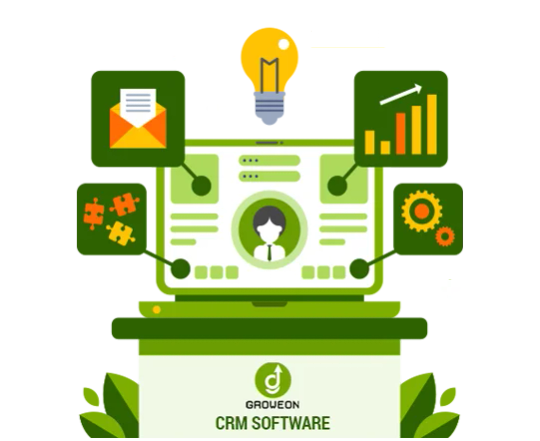
One out of five small businesses fail within the first year. No, this is not to demotivate you but to show you the reality of how important the first five years of a small business are. Most small businesses struggle to deal with customers as customers have different needs, and managing all your different customers feels next to impossible; that’s why you need CRM software.
Customer relationship management (CRM) software has revolutionised the way businesses interact with customers. It helps reduce the need for manual input by automating key processes like tracking customer interactions, managing leads, and organising sales pipelines. CRM software is proven to increase business productivity and efficiency and improve overall customer satisfaction.
Before you put your skates on and look for a CRM tool, it is crucial to choose a CRM tool that is perfect for your business, as the internet is flooded with tons of CRM software. Here are the key factors to consider when selecting the best CRM tool for your small business.
1. Identify Your Business Needs
Before diving into the technical details of various CRM tools, it’s important to clearly identify your business’s unique needs. Ask yourself questions like:
- What are your current pain points in customer management?
- Are you looking to streamline sales, marketing, or customer service processes?
- How many people will be using the CRM system?
Once you understand your specific goals, choosing CRM software will be quite easy for you as you can prioritise what features the software must have.
2. User-Friendly Interface
As a small business, you most likely won’t have a tech-savvy and highly experienced team, so it is crucial to choose CRM software with a user-friendly interface. A simple and user-friendly interface will allow your team to quickly adapt and use the software efficiently. Look for a CRM that offers an intuitive dashboard, easy navigation, and simple data entry processes.
Additionally, many CRM tools offer free trials, so take advantage of this to assess whether the platform is easy for your team to use and navigate.
3. Affordability
Most small businesses don’t have massive profits and income-generating revenues, so it is crucial not to get overexcited and choose CRM software that suits your budget. CRM software with more features and capabilities will cost more, so it is vital to understand your business needs and opt for a CRM that doesn’t break the bank and gets the job done. Groweon CRM software is quite affordable and has tons of features, so it is a great choice for small businesses.
4. Scalability
As your business grows, your CRM should be able to grow with you. Look for a CRM solution that offers scalable features so that you don’t outgrow the tool as your customer base expands. A scalable CRM will allow you to add new users, customise workflows, and integrate additional tools without disruption.
Choosing a CRM that can scale alongside your business will save you the hassle of transitioning to a new platform as your needs evolve.
5. Mobile Accessibility
In today’s fast-paced business environment, having access to your CRM data on the go is essential. Mobile accessibility enables you to update and access customer information, track sales, and communicate with your team from anywhere. This is particularly useful for small business owners or sales teams who spend a significant amount of time out of the office.
Ensure that the CRM tool you choose offers a robust mobile application that is easy to use and provides the same level of functionality as its desktop version.
6. Customer Support
Reliable customer support is crucial, especially when you’re first implementing a CRM system. Small businesses often lack the in-house expertise to troubleshoot technical issues, so having access to a responsive support team can make a significant difference.
Look for CRM providers that offer 24/7 customer support, training resources, and user communities. Some CRM tools even offer dedicated account managers for small businesses, ensuring that you get personalised help whenever needed.
Conclusion
Choosing the best CRM tool for your small business can make a world of difference to your business’s operations and massively improve productivity. No matter what industry you are in, ideal CRM software can transform the way you manage customers.
2 notes
·
View notes
Text

The more you can learn about your customers, the better you’ll be able to serve them. A CRM system that provides insights into what your customers do and how they interact with your products will help you make informed decisions.
A/B testing is one of the most powerful tools that marketing automation tools have to offer. It allows you to test different message versions or call-to-action versions and see which version performs best.
For example, let’s say you want to create a new email campaign for a new product release. You could send out an email with different call-to-action buttons (e.g., “Buy now!” vs “Download Now!”) and see which one gets more clicks on your website, resulting in more sales for your business.
A/B testing is also an excellent way to improve the customer experience by making minor tweaks to existing campaigns based on customer data collected from their interactions with your brand online or offline.
#best pipeline management software#marketing and sales automation tool in chandigarh#marketing automation tool in delhi#best sales pipeline management software#crm sales automation
0 notes
Text
SAP Business One ERP for Food and Beverage Industry
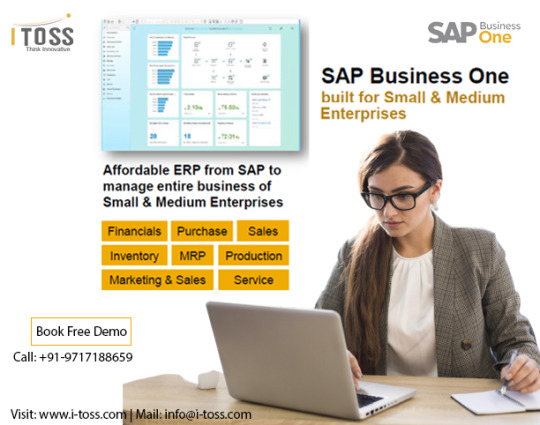
The food and beverage sector has thrived in recent years, attracting an increasing number of customers. Most Trusted, Secure & Powerful ERP Solutions This business is increasing global demand, resulting in a fast rise in food costs. this industry’s significant difficulties are growing demand for diversity and innovation, poor profit margins, product traceability, and quality government control. SAP Business One for Food and Beverage aids with all elements of the industry’s manufacturing and distribution.
This ERP Software analyses the current particular needs of the food sector SAP B1 for Food and Beverages Make your Manufacturing business run easier with the Globally most trusted ERP Solution, SAP Business One
SAP Business One for Manufacturers – SAP B1 ERP increases visibility and gives solutions in every aspect of your manufacturing operations and resolves your most frustrating production challenges. SAP B1 provider of one-stop management solutions for all manufacturing verticals, including the Apparel Manufacturing Industry, ensures daily operations effectively.
ERP for Manufacturing Industry supports standard assembly processes, disassembly, as well as special, production orders. SAP Manufacturing can easily centralize all records, analyze opportunity pipelines that can be entered into production orders, identify production slot availability, warehouse location, and issue methods are automatically recorded.
Recipe Management: SAP Business One allows businesses to create and manage recipes for their food and beverage products. This can include tracking ingredients, quantities, and costs, and managing allergen and nutritional information.
Quality Control: SAP Business One can help businesses track quality control measures for their products, including testing and inspections. It can also help manage compliance with regulatory standards and certifications. Inventory Management: SAP Business One allows businesses to manage their inventory levels, including tracking stock levels, setting up reorder points, and generating inventory reports.
Sales Management: SAP Business One enables businesses to track sales data, including the total sales revenue, sales by product, and sales by customer. It can also manage promotions, discounts, and pricing for different products. Purchasing Management: SAP Business One can help businesses manage their purchasing processes, including supplier management, purchase orders, and tracking deliveries.
Financial Management: SAP Business One includes financial management features such as accounting, budgeting, and cash flow management. This can help businesses manage their finances more efficiently and effectively. Reporting and Analytics: SAP Business One can generate reports on sales, inventory, and financial data, allowing businesses to analyze their performance and make informed decisions.
Overall, SAP Business One can provide food and beverage businesses with a comprehensive solution for managing their operations, from recipe management to inventory control, to financial management and reporting.
TOSS Solutions is the top SAP partner in India with SAP B1 market presence having been awarded as the SAP Business One #1 partner. ITOSS Solutions has over a decade-long successful history of rendering services from implementation, customization, support, managed services, cloud hosting, HANA, and migration services.
ITOSS Solutions has been recognized by SAP as the best SAP Business One Partner for the North & East India regions. ITOSS Solutions is a Top ERP Software Vendor based in Delhi NCR rendering its services across the country.
#SAPBusinessOneCloud#ERP#SmallBusiness#BusinessManagement#InventoryManagement#Accounting#Reporting#ERPSoftware#SoftwareSolutions#ERPForBusiness#CloudBasedSoftware#CloudERP#SAPLicense#SAPBusinessOne#businessowner
2 notes
·
View notes
Text
Only going to get worse. You know how it’s been demonstrated that most of the “inflation” of the last decade was actually just companies — and grocery stores are one of the notable categories — jacking up prices because they can? Well, one of the things about modern capitalism is that companies are expected not merely to remain profitable (which in some cases, like grocery stores, would be fairly easy) but have to have consistently increasing profits, year-over-year. If your company’s profits increased 4% relative to inflation last year, but only 2% this year, your company is viewed as in danger of failing — and if you’re just keeping up with inflation, the investors will actively flee.
Which means that all the companies which jacked up prices to see massive profits are left with a problem: they just increased profits massively by ripping everybody off! IIRC, grocery profits are generally up by something like 50% over five years ago! In order to not be considered failures, they need to keep increasing profits. People are starting to get suspicious, though — and people are also starting to be literally unable to afford the prices, which means that continuing to raise prices will cause a drop in sales which will potentially offset the extra profit.
That means they’re going to be looking for extra ways to increase their profits. One theoretical way to do that is to cut costs, but retail has a problem there because they’ve already done most of that. They’re all already doing lean staffing and just-in-time stocking. They’re all already paying the least they can get away with, and providing as few benefits as they can get away with. There’s no pension funds to raid and no insurance plans to cancel, they can’t cut the staff down when they’ve already barely got enough people to man the registers, they’ve already negotiated the best deals they can extort with their suppliers, so what costs can they cut?
Well, “shrinkage” (loss of stock) is a thing they know about and budget for, and that’s primarily associated with shoplifting (although it also covers stock which can’t be sold, usually because of damage, or gets lost in the system, or whatever — it’s the difference between the amount of stock they expected to sell and the amount they actually have on hand to sell). So what’s obviously going to happen in a lot of cases will be increasing paranoia about shoplifting. More security cameras, RFID tags on items so low-cost that the tag costs them a significant fraction of the price item itself, I’m sure the AI hucksters will sell them facial recognition software to catch “known” shoplifters (that’s been in the pipeline for years now).
And the thing is: this is going to fail, and the smarter people in the business already know this. These measures may or may not fail to stop shoplifting, but there just isn’t enough money being lost in shoplifting in most retail that they can increase profits significantly just by reducing it. (If the amount were that high, they would already have taken those steps.) By and large, this is just something that desperate managements will propose in order to satisfy the stock market, which demands they do something even there’s nothing they can meaningfully do, to postpone the inevitable pain the stock market will inflict as a punishment for failing to increase profits again. And even in the rare cases of stores where shoplifting represents a significant dollar amount — say, for example, places which sell electronics, but somehow have a high rate of shoplifting; I’m not sure if there are any places which actually fit that description, because places which sell electronics generally have security measures already in place for those items — they’re still going to have to come up with another way to cut costs further the next year. Great, our previously-implausibly-high level of shoplifting is down so the company made 5% more profit this year! Next year we have to keep shoplifting down so profits don’t fall back down, but also come up with a way to increase profits by 5% more! That’s just not going to happen. Setting the precedent of massive profit increases out of nowhere was a mistake to begin with.
And that means that all these retail businesses are going to take a big hit in the mid-range future. There’s nothing they can do to keep profits growing at the recent insane rates, and unfortunately the stock market may be detached from reality in many ways, but it can destroy a publicly-traded business in the real world by deciding it’s not viable.

Bruh
806 notes
·
View notes
Text
CRM Development in Riyadh: Unlocking Business Growth with Smart Solutions

Customer Relationship Management (CRM) software has become an essential tool for businesses looking to streamline operations, enhance customer engagement, and drive growth. In Riyadh, a booming business hub in the Middle East, the demand for custom CRM solutions is rising as companies seek tailored systems that align with their unique needs.
Why CRM Development is Crucial in Riyadh
With Riyadh's economy rapidly expanding across sectors like retail, finance, healthcare, and real estate, businesses need efficient ways to manage customer interactions. A well-developed CRM system helps companies:
Automate workflows to improve efficiency
Track customer interactions for better engagement
Enhance data-driven decision-making through analytics
Increase sales and revenue with optimized lead management
Ensure compliance with Saudi regulations regarding data security
Key Features of a Successful CRM
When developing a CRM system in Riyadh, businesses should focus on the following features:
1. Customizable Modules
Every business has unique needs. A good CRM should allow customization of sales pipelines, customer support dashboards, and reporting tools.
2. Multilingual & Localization Support
Since Riyadh is home to a diverse workforce and customer base, supporting both Arabic and English is crucial. This ensures seamless communication and user-friendliness.
3. Integration with Existing Systems
A CRM should integrate with ERP systems, accounting software, marketing automation tools, and e-commerce platforms for smooth operations.
4. AI-Powered Analytics & Automation
Using AI for predictive analytics, customer segmentation, and automated follow-ups can enhance engagement and boost sales.
5. Mobile Accessibility
With the high mobile usage rate in Saudi Arabia, a CRM with a mobile-friendly interface ensures that sales teams and customer service reps can access data on the go.
6. Compliance & Data Security
Given Saudi Arabia’s strict data protection laws (such as the Personal Data Protection Law - PDPL), CRM systems must have robust security measures, including encryption, role-based access, and secure cloud storage.
Choosing the Right CRM Development Approach
Custom CRM vs. Off-the-Shelf Solutions
Custom CRM: Best for businesses with specific workflows and unique requirements. It offers scalability and full control over features.
Off-the-Shelf CRM (e.g., Salesforce, HubSpot): Faster to implement but may require extensive customization to fit local business needs.
On-Premise vs. Cloud-Based CRM
On-Premise CRM: Offers full data control but requires higher maintenance and infrastructure costs.
Cloud-Based CRM: Provides scalability, remote access, and cost-effectiveness, making it ideal for businesses in Riyadh looking for flexibility.
Finding the Right CRM Development Partner in Riyadh
When selecting a CRM development company in Riyadh, consider: ✅ Experience in CRM development for your industry ✅ Knowledge of Saudi business regulations and data security compliance ✅ Ability to provide ongoing support and updates ✅ Expertise in cloud computing, AI, and API integrations
Final Thoughts
Developing a CRM system in Riyadh requires a strategic approach that considers business needs, local compliance, and future scalability. Whether you’re a startup or an established enterprise, investing in a well-structured CRM can enhance customer experiences, optimize workflows, and drive business success in Saudi Arabia’s competitive market.
Looking for expert CRM development services in Riyadh? Contact a trusted development partner to build a CRM that aligns with your business goals. 🚀
1 note
·
View note
Text
CRM for Sales Success: Streamline Your Pipeline & Close More Deals
In today’s competitive business landscape, managing leads effectively is crucial for driving sales and sustaining growth. A well-structured Customer Relationship Management (CRM) system can significantly enhance your sales pipeline, ensuring you never miss an opportunity to convert a prospect into a loyal customer. With the right Free Lead Management Software or the Best Lead Management Software, you can automate tasks, nurture leads efficiently, and close more deals. Let’s explore how CRM can revolutionize your sales success.
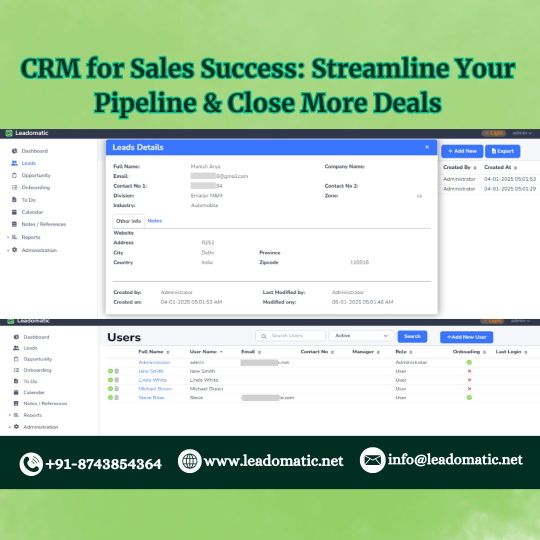
Why Your Business Needs a CRM for Sales Success
Sales teams often struggle with disorganized data, missed follow-ups, and inefficient communication. A robust CRM system provides a centralized platform where all sales-related activities are tracked and managed seamlessly. Here are some key benefits:
Automates Lead Tracking – A CRM captures leads from various sources such as websites, social media, and emails, eliminating manual data entry.
Improves Sales Pipeline Visibility – Get a clear picture of your sales funnel, allowing for better forecasting and decision-making.
Enhances Customer Engagement – Personalized follow-ups and automated reminders ensure no lead falls through the cracks.
Boosts Team Productivity – Automating repetitive tasks frees up time for sales teams to focus on closing deals.
Provides Data-Driven Insights – Detailed analytics help identify successful strategies and areas that need improvement.
Features of the Best Lead Management Software
Choosing the Best Lead Management Software means finding a solution that aligns with your business needs. Here are some must-have features:
Lead Capture & Organization – Automatically collect and categorize leads from multiple sources.
Automated Follow-Ups – Set reminders and schedule emails to nurture leads effectively.
Pipeline Management – Visualize and track the progress of each lead in the sales funnel.
Integration Capabilities – Sync with marketing tools, email platforms, and accounting software.
Performance Analytics – Generate reports to measure conversion rates, team performance, and ROI.
Mobile Accessibility – Access lead data on the go, ensuring flexibility and efficiency.
How Free Lead Management Software Can Help Startups & Small Businesses
For startups and small businesses with limited budgets, investing in expensive CRM solutions might not be feasible. Fortunately, Free Lead Management Software offers an excellent alternative with essential features to streamline sales operations. Some of the advantages include:
Zero Cost Investment – Get started without financial commitments.
Basic CRM Functionality – Access fundamental tools for lead tracking, contact management, and follow-up scheduling.
Scalability – Upgrade to premium plans as your business grows.
Easy Setup & User-Friendly Interface – No need for extensive training or technical expertise.
Best Practices for Using CRM to Close More Deals
Implementing a CRM is just the beginning; using it effectively is what drives sales success. Here are some best practices to maximize your CRM’s potential:
Segment & Prioritize Leads – Categorize leads based on their potential value and engagement level to focus on high-converting prospects.
Personalize Communication – Use CRM insights to tailor messages and offers based on customer preferences.
Automate Repetitive Tasks – Reduce manual work by setting up automated email sequences and follow-up reminders.
Track Performance Metrics – Regularly review CRM analytics to refine your sales strategies.
Train Your Sales Team – Ensure that your team is well-versed in using CRM tools to improve efficiency and customer relationships.
Conclusion
A well-implemented CRM is a game-changer for businesses looking to optimize their sales process and close more deals. Whether you choose a #FreeLeadManagementSoftware to get started or invest in the Best Lead Management Software for advanced functionalities, leveraging a CRM will undoubtedly enhance your lead conversion rates and overall sales performance. Start today and transform the way you manage leads to achieve long-term business success!
#Free Lead Management Software #Best Lead Management Software
#LeadManagementSoftware#BestLeadManagementSoftware#FreeLeadManagementSoftware#LeadManagementTools#BestCRMForLeadManagement#LeadManagementSystem#LeadTrackingSoftware#SalesLeadManagementSoftware#CRMAndLeadManagement
0 notes